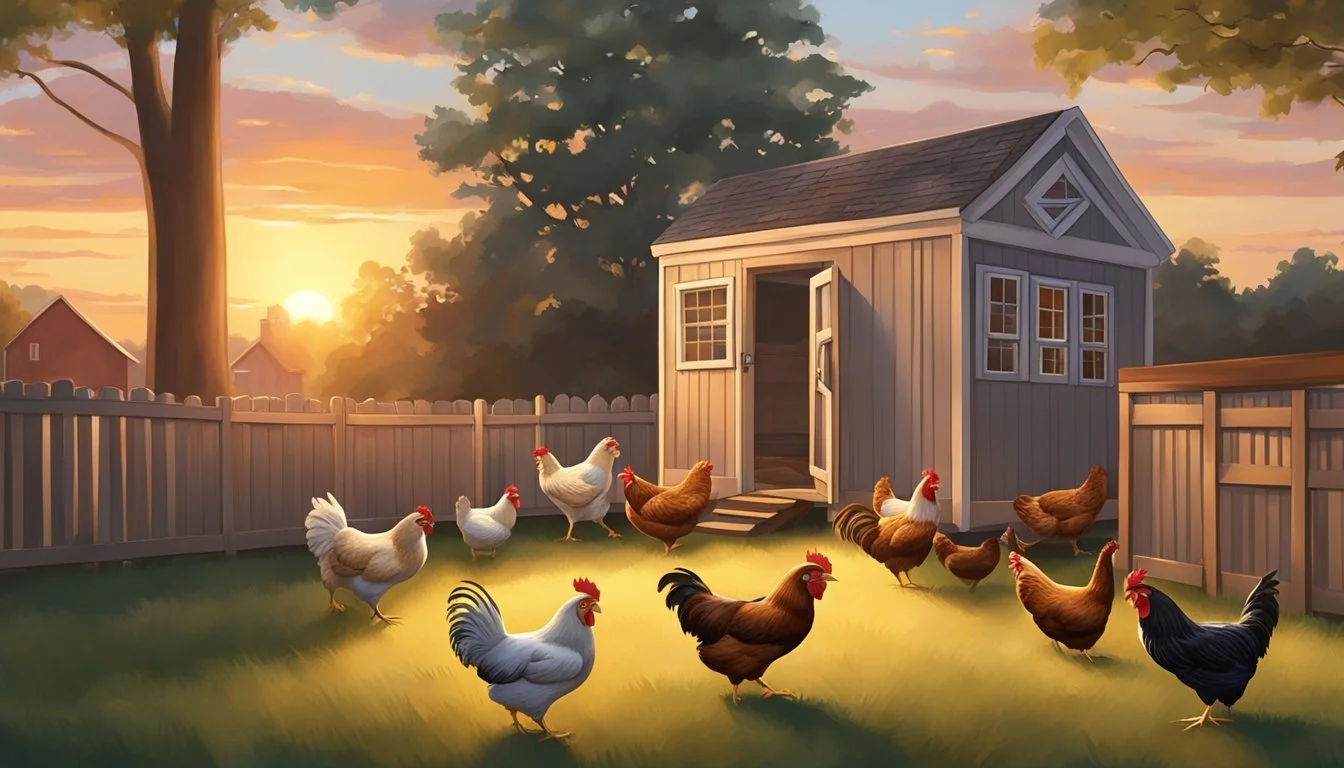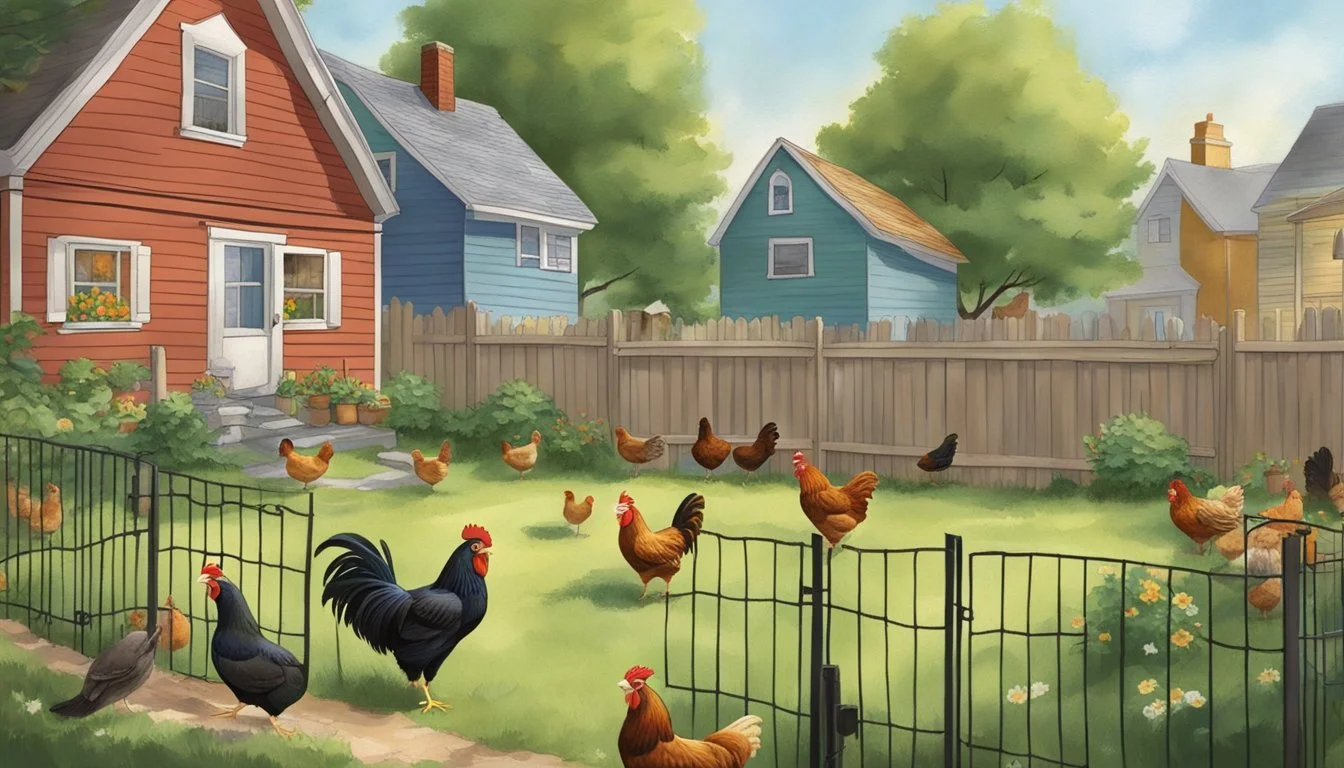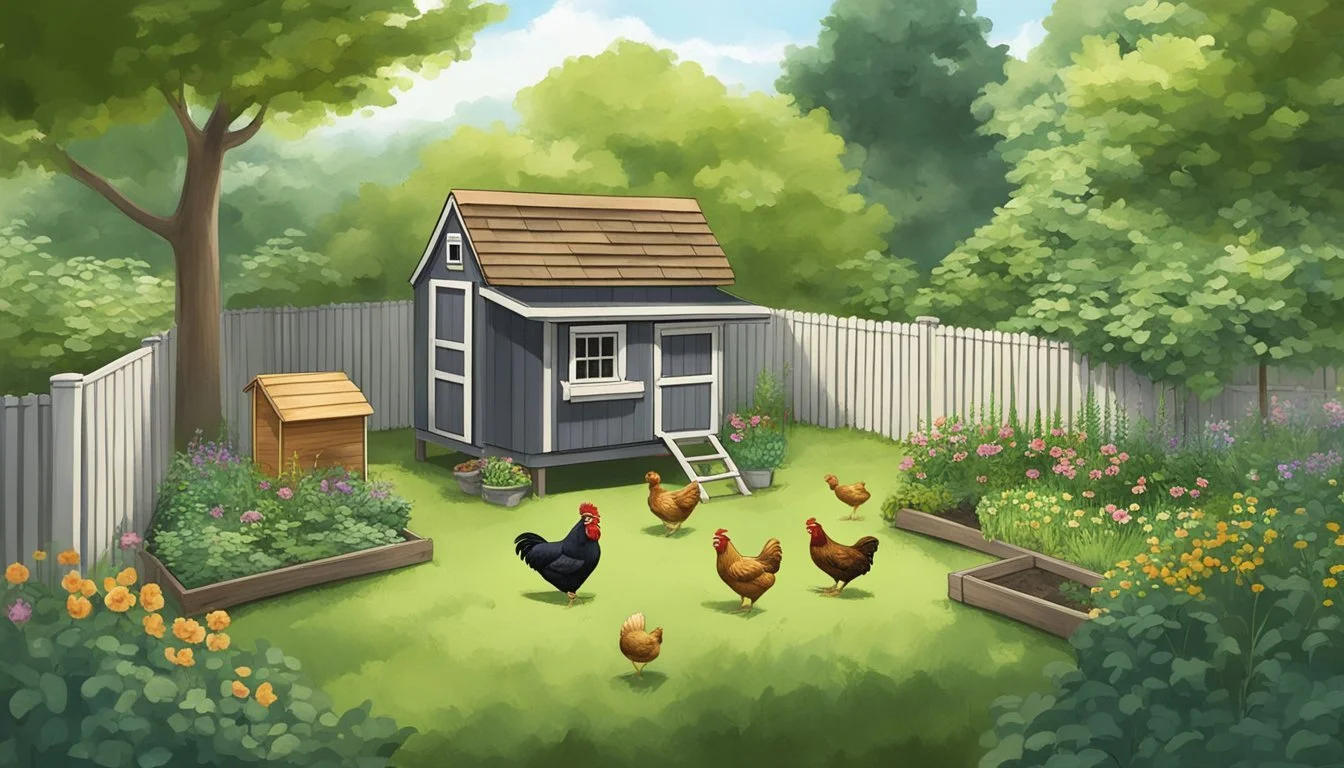Keeping Backyard Chickens in Yonkers, NY
Essential Tips for Urban Poultry Farming
Raising backyard chickens has become an increasingly popular practice in many parts of the United States, including in suburban and urban areas. However, in Yonkers, NY, the regulations for keeping backyard chickens are specific and must be adhered to by residents. The city of Yonkers maintains ordinances that permit the keeping of chickens but under certain conditions. For instance, chickens can be kept for sale in a live poultry market, at mercantile establishments, or as domestic pets. These regulations are in place to balance the interests of urban agriculture enthusiasts with concerns for public health, safety, and neighborhood welfare.
New York State varies in its regulations on raising chickens from one municipality to another. In contrast to Yonkers, some other areas in New York allow backyard chickens with fewer restrictions. Residents of Yonkers interested in raising chickens need to be aware of the city's specific ordinances which do not specify a limit on the number of chickens but implicitly require that the birds do not become a nuisance or health hazard. Adequate space, sanitation, and noise control are critical factors that potential chicken keepers must consider when setting up a backyard coop in Yonkers.
While Yonkers allows the keeping of chickens under certain conditions, neighboring New York City has stricter laws, typically disallowing backyard chickens within city limits, especially in residential areas. New York City's stringent stance is mainly due to potential noise complaints, particularly from roosters, and public health concerns. Keeping backyard chickens requires a comprehensive understanding of local laws, respect for community standards, and a willingness to maintain poultry responsibly.
Understanding Local Regulations
When keeping backyard chickens in Yonkers, NY, it is imperative to adhere to specific local regulations that govern zoning, nuisances, public health, and more.
Zoning Ordinance and Permits
In Yonkers, zoning ordinances delineate where and how poultry can be kept. Homeowners must check with local zoning offices to determine if their area is zoned for keeping poultry and if a permit is necessary for the activity.
Nuisance and Noise Regulations
Nuisance laws enforce regulations to assure that chickens do not become a problem to neighbors. Yonkers strictly prohibits nuisance conditions, with particular emphasis on noise regulations, which typically involve restrictions on keeping roosters due to their crowing.
Public Health and Safety
The municipality places high importance on public health and safety regulations to prevent the spread of disease like salmonella and avoid issues with rodents. Enclosures in Yonkers must be maintained and food must be stored in rodent-proof containers.
Laws Pertaining to Specific Poultry Types
Within Yonkers, specific laws may apply to different types of poultry, such as chickens, roosters, geese, ducks, and turkeys. Each category may have distinct local ordinances addressing enclosure size and type.
Prohibited Areas and Lot Size Requirements
Certain areas within Yonkers may be completely prohibited from keeping backyard chickens. If it is permitted, there may be lot size requirements that specify the minimum amount of space needed to legally keep chickens.
Article 161.19 of NYC Health Code
While Yonkers has local regulations in place, it is essential to consider Article 161.19 of the NYC Health Code when discussing poultry within the context of the larger New York area. This health code establishes additional rules about the keeping of live poultry within the city limits, which could influence regulations in nearby Yonkers.
Preparing Your Property
When setting up for backyard chickens in Yonkers, NY, one must consider the location of the coop, design a safe and effective structure, and ensure the coop is secure against predators.
Choosing the Right Location for Coop
The location of the chicken coop is pivotal for ensuring the health and safety of the chickens. In Yonkers, homeowners should ensure the coop does not infringe upon any local regulations which may govern the distances from property lines or neighboring structures. It's crucial to select a spot with good drainage to avoid water accumulation which may lead to unsanitary conditions or damage to the coop itself.
Safe and Effective Coop Design
A well-designed coop is essential for the comfort and safety of backyard chickens. It must provide adequate space for the number of chickens being kept—generally, 3-4 square feet per chicken inside the coop and 8-10 square feet per chicken in an outside run. Ventilation is important to prevent respiratory issues, but drafts should be minimized to protect the chickens from cold weather.
Ventilation: Windows or vents positioned high in the coop.
Insulation: Suitable materials to maintain a consistent temperature.
Nesting boxes: One box per 4-5 hens.
Perches: Space to roost away from feces and ground-level dampness.
Security: Durable latches and robust materials to deter predators.
Protecting Against Predators
The coop and any enclosures must be fortified against a variety of predators. Residents in Yonkers should be aware that local wildlife such as raccoons, foxes, and even birds of prey can pose a threat to backyard chickens. It can be beneficial to bury hardware cloth at least 8 inches below the surface around the perimeter of the coop to deter burrowing animals. Additionally, a skirt of chicken wire around the coop, held down with rocks or heavy objects, can prevent animals from digging under the walls. All openings should be covered with wire mesh, and doors must close securely.
Chicken Care Essentials
Keeping backyard chickens in Yonkers, NY, involves strict adherence to local regulations while ensuring that the birds receive optimal care for their well-being. A detailed focus on their feeding, health, regular maintenance, and egg handling is crucial for a successful backyard flock.
Feeding and Nutrition
Proper nutrition is fundamental to the health and productivity of backyard chickens. Chickens require a balanced diet comprised of proteins, carbohydrates, fats, vitamins, and minerals.
Starter Feed: Chicks should be given a starter feed with 18-20% protein for the first 8 weeks.
Grower Feed: From 8 to 14 weeks, a starter/grower feed with 16-18% protein is advised.
Layer Feed: At 15-18 weeks, transition to a 16% protein finisher or layer feed for hens laying eggs.
Feed should be stored in rodent-proof containers to prevent contamination.
Health and Disease Management
Monitoring health and preventing disease is paramount in backyard poultry management.
Veterinary Care: Regular check-ups from a veterinarian experienced in poultry can catch and prevent health problems.
Vaccinations: Administer recommended vaccines to guard against common diseases.
Disease Prevention: Implement biosecurity measures such as quarantining new birds and disinfecting equipment.
Salmonella: Practice good hygiene to reduce the risk of salmonella and other zoonotic diseases.
Daily Maintenance and Cleaning
Consistent cleaning and maintenance are essential for keeping chickens healthy and reducing the chance of disease spread.
Coop Cleaning: Clean and disinfect the coop regularly to prevent the buildup of droppings and waste.
Ventilation: Ensure proper ventilation to reduce moisture and ammonia levels.
Rodent Control: Secure feed and eliminate potential rodent nesting sites.
Egg Collection and Storage
Efficient handling of eggs is essential for food safety and quality.
Frequency: Collect eggs at least once a day.
Cleaning: Wipe off any dirt with a dry cloth; if washing is necessary, use water warmer than the egg’s temperature.
Storage: Store eggs in a cool, dry place or refrigerate them to maintain freshness.
Proper care for backyard chickens includes a diverse array of responsibilities, ranging from providing balanced diets to ensuring sanitary living conditions. It's a commitment that demands attention to detail but offers the rewarding experience of fresh eggs and the companionship of the fowl.
Community and Neighbor Relations
In Yonkers, NY, successful backyard chicken keeping requires a harmonious relationship with one's neighbors and an understanding of the community's standards and resources.
Handling Complaints and Resolving Conflicts
When neighbors raise concerns about backyard chickens, it is important to respond promptly and address issues directly. Owners should introduce themselves to the complaining party and use 'I' statements to discuss the matter, showing respect for the neighbor's perspective. They should aim to find a compromise that minimizes nuisance and adheres to local ordinances. Keeping poultry in close community settings means being vigilant about noise, odors, and waste management to prevent complaints.
Document resolutions: Keeping a record of any agreements or actions taken can be helpful should issues persist or escalations occur.
Educating Neighbors on Backyard Chickens
Education plays a pivotal role in maintaining good relations within the community. Chicken keepers should take the initiative to inform their neighbors about the benefits and realities of keeping poultry. They can share information on how their activities align with Yonkers regulations, the preventive measures taken against rodents, and the controls in place for feed storage. Properly educating neighbors helps dispel myths and can turn them into allies.
Informational pamphlets or sessions: Offering clear and concise information can foster understanding and acceptance within the community.
Participating in Local Poultry Communities
Engagement in local poultry communities offers substantial benefits. Such associations provide support, share best practices, and advocate for backyard chicken keepers' interests. They can mediate disputes and help to reinterpret local laws in favor of responsible poultry keeping. Participation in such groups underlines the community’s commitment to maintaining peaceful and cooperative relationships among neighbors.
Community events or forums: These platforms can facilitate the exchange of knowledge and experiences among local chicken enthusiasts.
By proactively managing relationships with neighbors, educating the local community about the benefits and practices of keeping backyard chickens, and engaging with local poultry communities, Yonkers residents can foster a cooperative environment conducive to their hobby. They also ensure that the keeping of poultry does not become a source of conflict, but rather a well-regarded aspect of community life.
Legal Considerations and Future Outlook
The citizens of Yonkers, NY, must navigate a specific set of laws and engage with city officials to address the future of backyard chicken keeping in their locale.
Staying Informed on Changing Laws
Yonkers residents interested in keeping backyard chickens should be aware that local laws currently restrict the practice. Legislation, both existing and potentially new, can alter these conditions. It is crucial for residents to regularly consult the Yonkers City Code and stay abreast of any public hearings or announcements related to local chicken laws. This proactive approach ensures that residents are compliant with current regulations and prepared for any future changes.
Key resources include:
Yonkers City Code: for current restrictions and conditions
City Council Meetings: for discussions on policy changes
The Role of City Officials and Government
City officials have the authority to shape legislation governing the keeping of backyard chickens. It is the responsibility of local government in Yonkers to balance the interests of the community with public health and safety regulations. Concerned citizens should engage with their representatives, providing feedback and expressing desires for any legislative amendments. Participation in public forums and reaching out directly to city council members can influence the outlook of local regulations.
Local government action items include:
Assessing community interest and concerns
Implementing regulations that reflect the city's stance on urban agriculture
Residents should monitor actions by city officials for any changes to backyard chicken keeping laws.
Additional Urban Farming Activities
In addition to keeping backyard chickens, urban farmers in Yonkers have the opportunity to engage in a variety of sustainable agricultural practices, like beekeeping and plant cultivation, as well as raising various types of livestock within the constraints of urban space.
Exploring Beekeeping and Plant Cultivation
Beekeeping has become an essential part of urban farming, providing pollination for a vast range of flowering plants and crops. In Yonkers, aspiring beekeepers must ensure they adhere to local regulations regarding hive placement and management. This activity not only supports local biodiversity but also produces honey, an added benefit for urban farmers.
Plant cultivation strengthens community agriculture by utilizing available spaces such as rooftops, balconies, or community gardens. Urban farmers in Yonkers focus on crop selection based on the area's climate and space limitations, often opting for vegetables, fruits, and herbs that do not require large plots of land but still yield abundant harvests.
Raising Other Livestock Within City Limits
While chickens are the most common urban livestock, other animals such as ducks, geese, and turkeys can also be part of an urban farm. Prospective urban livestock owners should:
Verify local ordinances to understand the limitations and requirements for keeping additional livestock.
Implement proper enclosures and waste management systems to maintain a clean and healthy environment.
Particularly, ducks offer similar benefits to chickens through egg production and pest control. Geese can serve as natural lawnmowers and alert animals. Raising turkeys in the city is less common, but they can be a source of meat as well as an engaging part of the farm's ecosystem when managed properly.
Resources and Further Reading
For residents of Yonkers, NY interested in keeping backyard chickens, obtaining accurate and comprehensive information is essential. The following resources provide legal frameworks, practical advice, and an understanding of the local ordinances:
City Ordinances: Accessing the local city ordinances is crucial. For Yonkers, the official city website provides details on poultry or fowl restrictions and guidelines for keeping chickens within city limits. It's important to review any additions to Local Law No. 6-1990, which lays out the parameters for lawful poultry keeping.
BackYard Chickens Forum: An online community of poultry enthusiasts, BackYard Chickens offers a platform to exchange tips, share experiences, and ask advice about raising chickens.
ChickenLaws.com: Specializing in local chicken laws, ChickenLaws.com provides a curated list of regulations pertaining to the feeding and keeping of poultry animals, including specifics for Yonkers.
Print Literature: Books such as "Storey's Guide to Raising Chickens" by Gail Damerow offer comprehensive information regarding chicken care, coop design, and breed selection. These can often be found at your local library or bookstore.
Community Workshops: Local agricultural extension offices or farming cooperatives may host workshops on responsible chicken keeping, covering hands-on skills like coop construction and maintenance.
Resource Type Resource Name Relevance Municipal Code Yonkers City Ordinances Legal Requirements for Backyard Chickens Online Community BackYard Chickens Forum Discussions and Advice Law Repository ChickenLaws.com Local Yonkers Chicken Laws Literature "Storey's Guide to Raising Chickens" Comprehensive Guide to Raising Chickens Educational Workshop Local Extension Offices Practical Chicken Keeping Skills
For those keeping chickens in Yonkers, it's imperative to abide by city regulations while also caring for poultry responsibly. Seek out these resources for guidance and support throughout your chicken-keeping journey.








